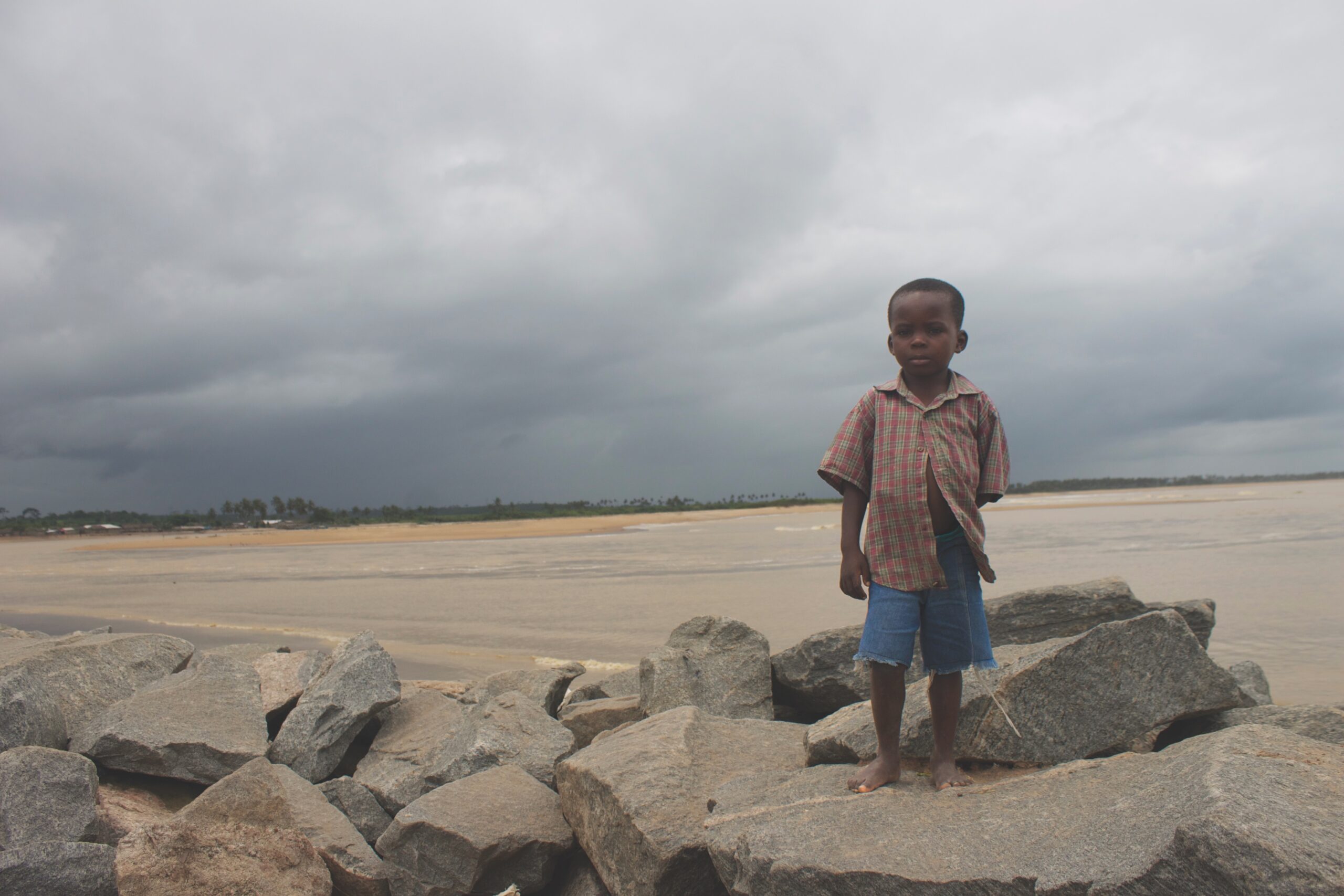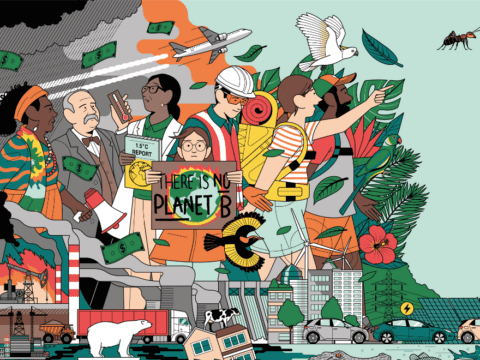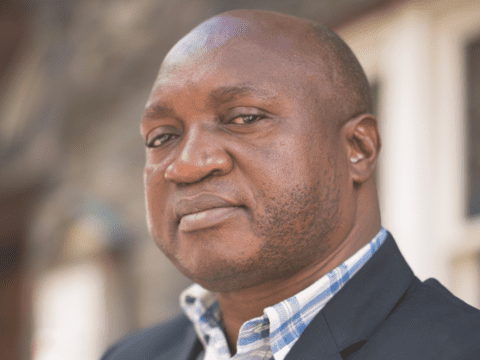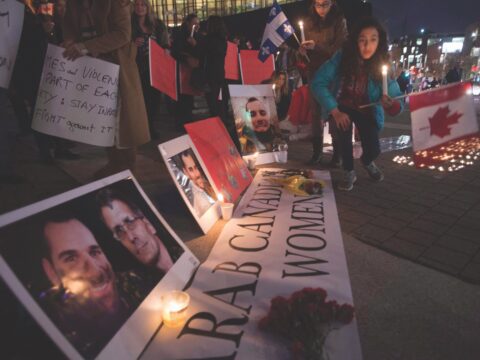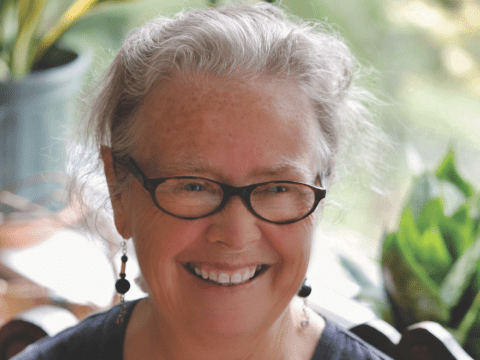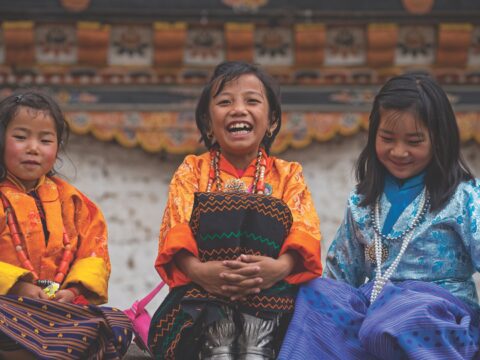From atop the whitewashed walls of Fort San Sebastian in Ghana, my companion and I have a full view of a bustling fish trade extending along a small harbour. Several hundred metres below us, children, barefoot and shirtless, stage an impromptu soccer match next to the open fish smokers, happily including several stray dogs in their game. The teal blue water of the estuary laps at the row of handcrafted fishing canoes anchored on the sand.
Since the region discovered oil off its coast in 2007, Shama District, a mostly rural area in western Ghana, has seen the development of several beach resorts and even a golf course. For the most part, though, this small village, settled in the ninth century and one of the region’s oldest coastal communities, is exactly as it has always been.
Fishermen mend their nets by hand, and women sell fresh produce in a large open marketplace. Despite obvious modern advancements, like telephone lines and taxis, the local economy still thrives almost exclusively on fishing, farming and petty trade. To the far southwest, mud-and-thatch houses remain unconnected to the country’s electricity grid. The village looks almost unchanged from the past century, with one notable exception — its shrinking beach.
In the past several decades, the coastline of Ghana’s Western Region, including Shama, has eroded by several hundred metres, the result of rising sea levels. The half-constructed sea defence wall jutting out from Shama’s banks has done little to prevent the water from creeping closer and closer to shore and invading the nearby villages.
“We have been experiencing certain things which have not been experienced even two decades ago,” says my companion, Christian Baidoo.
Baidoo, a radio and television reporter from Skyy Power FM in Takoradi, points to the base of the fort, where a sleeping stray dog is draped over the monumental tombstone of Ghana’s most famous 18th-century philosopher, Anton Wilhelm Amo. The shade from the headstone and the coolness of the cement provide the orphan pup with a reprieve from the hot mid-afternoon sun and the stifling humidity of West Africa’s rainy season. The fort seems to be as much a hideout for errant dogs as it is a tourist attraction; on a Saturday afternoon, Baidoo and I are its only visitors. That’s not surprising. Most people come to this fishing village, a 20-minute drive from the Western regional capital of Takoradi, for cheap fresh fish — the area has more impressive castles.
But for Baidoo, this colonial remnant is a source of extreme regional pride. The 30-year-old environmental journalist grew up in Shama and is a wealth of knowledge about his town’s historical significance. Once the largest castle of the Portuguese, Fort San Sebastian was conquered by the Dutch in 1640 and rebuilt with stones brought over from Denmark.
The philosopher, Amo, is celebrated as the first African to receive a European education. His gravestone now overlooks his tiny resting place and, to Baidoo, stands as a reminder of the contributions Ghana has made to the world. A world that, in our own time, has been reluctant to take the necessary measures to prevent this small but culturally significant village from being washed away by the sea.
Even more discouraging than inaction are the proposals put forward and then defeated or rescinded because of party politics, like the most recent American climate bill, rejected by the Senate in 2010.
“We thought since we’ve already started experiencing the negative consequences of climate change . . . ” Baidoo trails off. “That initiative would have gone a long way to help us.” He is matter-of-fact, used to the political rhetoric aimed to justify doing nothing, even when extreme flooding and tidal waves threaten to displace his entire childhood town.
Shama is only a tiny pinpoint on the map of communities that will be affected by global climate change. “Most of the people on the Earth are going to be impacted by this, and the amazing thing is we have so little voice in it,” says Tim Barnett, a marine physicist and climate change expert at the Scripps Institution of Oceanography in San Diego.
Already, the average temperature on Earth has increased one degree since the beginning of the industrial period. And according to Barnett, even if we were to cease all greenhouse gas emissions today, the temperature of the planet would continue to rise for at least another half century, bringing with it increasingly devastating changes in weather patterns, more droughts and extreme flooding. “What once was the extreme, now is the norm,” he says.
Virginia Burkett, chief scientist for climate and land use change with the United States Geological Survey, concurs. “The science indicates that we will see more extreme events in terms of droughts and floods in much of the land surface of the northern hemisphere and also a tendency for intense, more destructive tropical cyclones,” she says.
And it’s developing countries, like Ghana, sub-Saharan Africa, Bangladesh, North China and the Middle East — whose average per capita emissions are only a third of developed nations — that will be hardest hit, bearing an estimated 70 to 80 percent of the costs of damage caused by global climate change.
According to the World Bank’s 2010 World Development Report, “Climate change will wreak havoc everywhere — but it will increase the gulf between developed and developing nations.” Says Burkett, “The developing world does not have access to the institutional, financial and technological resources needed to prepare for disasters or recover from them.”
It’s a steep hike from Fort San Sebastian to the shore. Baidoo and I meander down the road to the main street, careful not to trip over the unevenly paved potholes. The town’s commercial district is a conglomeration of poorly constructed cement buildings and shops set up in metal containers where women sell small convenience items. Half-clothed children run happily unsupervised in the street and offer their coins to the women vendors for small imported candies.
The Methodist church in the centre of two separate residential developments, Shama Apo and Shama Bentsir, stands almost twice as high as most of the 900 single-storey homes with corrugated aluminum roofs, which house more than 10,000 people. Unlike the mud houses on the other side of town, these homes are made of cement and have electricity, but it’s unclear how many of them would survive a major tropical storm or tidal wave.
As we pass through town, a group of children chant “obruni,” the word for “white person” in the local dialect, and smile and wave frantically. Few foreigners frequent Shama, and my return wave is something they will run home and tell their parents about.
As we near the estuary, Baidoo points out a woman selling shark fins on the roadside. “What do they do with them?” I ask.
“They eat them.” Baidoo says it as if I should have known that. Before I can ask him if that’s legal, I am approached by one of the curious children. “Obruni, twame nfonyi,” insists a particularly cute barefoot boy no older than five.
“He wants you to take a photo of him,” Baidoo says, gesturing to the camera hanging around my neck.
I nod and the boy smirks at his friends, happy to be rewarded for being the bold one of the bunch. I point to the seawall beside the woman’s shark fins, and he nimbly climbs onto the rock boulders, posing for me at eye level. Behind him, children play in the rocks, dangerously close to where the Pra River feeds into the Atlantic Ocean.
If it weren’t for the multi-million-dollar sea defence wall, the whole town might be under water, but the wall has attracted controversy for possibly adding to the flooding of neighbouring townships. Once I take my photograph, I help the small boy down and show him his photo. He beams proudly and gratefully and then rejoins his friends.
Baidoo then leads me to where the local fish market has attracted a crowd. The beach is barely big enough to contain the buyers and sellers, and many of the fishermen are wading in several feet of water as they toss their catch onto the ever-shrinking shore. Large rifts of sand several feet high show how much the shoreline has eroded, a constant reminder of the problems to come.
Shama’s coastal erosion issues stem in part from a long list of environmental negligence on the part of citizens and local governments. Both legal and illegal sand removal, known as “sand winning,” is still heavily practised, usually for building construction. Besides natural patterns of erosion, the increasing population continues to engage in careless human behaviour, like dumping sewage and garbage into the ocean. Paired with a lack of regulation, this has exacerbated the village’s environmental problems.
However, climate change now poses a different and much scarier threat. Sea levels are expected to rise more than one metre over the next century, something the district of Shama cannot control or withstand. In only a short time, a community that has existed and thrived for more than 1,200 years could literally be swept away with the tide.
“We are frightened by the level of the water,” one Shama resident tells us. “If God doesn’t intervene and there’s no sea defence, in five years, the whole city will be eroded, destroying people’s homes and the ovens they use in smoking the fish.”
He points to the tide, which in the early afternoon has already reached the fish smokers. Most local businesses operate right along the shoreline. According to the country’s official sources, the beach at Shama has eroded 100 metres in the past five decades, but many of the fishermen say they remember the beach extending further than that.
Neighbouring villagers from Shama Beach, a small settlement across the Pra River, glide slowly toward shore in handcrafted canoes with small outboard motors, here to join the fish trade. Once on land, they are immediately accosted by more stray dogs. Nineteen-year-old Patience Amusa is among the villagers. Slender, her hair wrapped in brightly coloured cloth, she is cheerful and friendly when we approach her. Her young age still gives her a local frame of reference of almost two decades. “We are worried because at times [the sea] takes people’s properties away, it spoils people’s lives,” she says.
I ask her what she thinks the government should do. “The government? I think they should find a way of — I don’t know what to say now.” She thinks for a long time. “They have told us to move away from this place and move to a certain place where we can be satisfied, but our parents say when they move away from the sea, they don’t have a way to get to the fish.” She blushes when she can’t think of a solution. “I don’t know if they can find a way to stop the river from coming into people’s houses.”
A group of school-aged girls carrying fish in plastic containers on their heads pass us. “Obruni, how are you?” one of them asks and then utters some sounds that only resemble English words. I watch her pass, giggling with her friends. The canoe behind them has the inscription “God knows.” I turn back to Amusa and thank her for the interview.
Baidoo is anxious. “The rate at which coastal communities are experiencing sea erosion, it’s quite alarming. The belief is that when you construct sea defence walls, we will be free from such problems, but when you see the rate at which the sea is extending its boundary and coming into the community, that’s not going to be the best solution. The best will be for people to relocate.”
But where do they go?
Only 60 kilometres from Shama’s shores, a large rig attracts oil tankers into its waters. Unregulated drilling operations like this have only recently sprung up off Ghana’s coastline. “If we were not, strictly speaking, in a rush and we were to actually move according to our own pace, we could have dealt with all the legal regimes and ensured that the proper instruments were in place before we even started harnessing the first barrel,” Awulae Annor Adjeye III tells me.
Adjeye is the paramount chief of Beyin, another fishing community on Ghana’s western coast. He is one of several traditional chiefs pushing for 10 percent of oil revenues to be returned to the operating budgets of municipalities in the Western Region, what he calls “the breadbasket of the nation,” for investment in modern infrastructure, job employment and his main priority: environmental conservation. So far, he says, the environment has been overlooked in the fervour to join the world’s oil-producing nations.
It’s not hard to see why. “A country which is cash-strapped will always look to take advantage of any revenue,” Adjeye says. “Roughly 50 percent of our budget is supported from outside.”
The chief is well read and articulate, but he strings his sentences together with a rising intonation — this issue is clearly a personal passion of his. He quotes figures and scenarios, like the amount Kosmos Oil, an American-based oil company, was made to pay for a spill last year near the tourist resort of Axim, about 70 kilometres west of Shama. Even though the fine was in the millions, Adjeye says it was minor compensation for the damage already done to tourist revenues and the local ecosystem.
“The environmental impact of the oil industry is something that nobody should play down,” he continues. Adjeye isn’t convinced the government has a handle on controlling and developing the new resource responsibly. Drilling has taken place for over a year, and there is still no monitoring body in place to regulate the activities of the offshore rigs, even though the oil industry is one of the major contributors to the world’s carbon footprint.
It’s the catch-22 many developing countries face. Building a strong economy in the global marketplace means contributing even more to the world’s energy consumption and, as a result, adding to its climate change problems.
Canada’s decision to back out of the Kyoto Protocol just after the United Nations Climate Change Conference in Durban, South Africa, in December drew enormous international backlash. Experts like Tim Barnett agree that investing in ways to prevent additional heating of the planet is not only best for the environment, but it’s best for the economy. If the overall global temperature increases even another degree, it could have a devastating impact on international trade.
Even the World Bank asserts in a 2010 report that the current recession is no excuse for inaction. “For all the harm they cause, financial crises come and go. Not so with the growing threat imposed by a changing climate,” it states.
The developed world needs to take the lead. Barnett would like to see the United States take national responsibility for reducing or eliminating its carbon emissions. But he doubts that will happen. “I don’t think people will really get concerned about [climate change] until we have some catastrophe.”
That catastrophe could be the displacement of millions of people around the world, cut off from food or water due to drought or flooding. “It has the potential to spawn a lot of regional conflict,” he says.
Back on the shore, Baidoo bends down to pick something from the sand. “It’s a piece of bone from a shark’s spine.” He lets me examine it and explains that a whalebone is an even bigger treasure.
Sometimes whalebone washes up on shore, and people believe it to be a sign of the gods. Baidoo leads me further along the beach to a group of fishermen eating. The men have made a shrine of a nearly foot-long whalebone they retrieved from the beach. A small screen and a glass bottle for libation have been placed beside it. Through Baidoo’s translation, I understand that one of the men has been assigned to communicate with the deity they believe lives incarnate in the bone.
I’m fascinated, but they won’t allow me to take a photograph. So we walk away. Making our way back, I stare down at the sand, thinking whalebones will no longer wash up on shore if the shore is gone. Baidoo interrupts my thoughts to ask me, “In Canada, do people worship these lesser gods?”
I don’t know how to answer him. Given what we’ve prioritized in our public policy, perhaps even lesser ones, I think.
***
This story first appeared in The United Church Observer’s April 2012 issue with the title “An ominous tide.”

